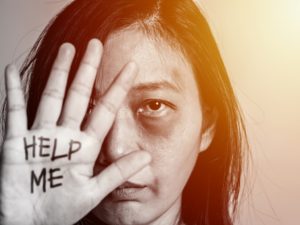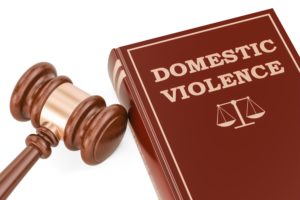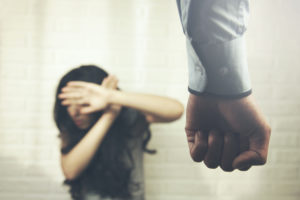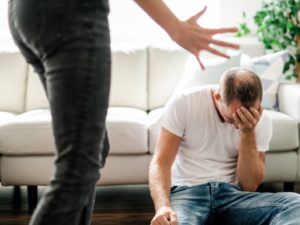The Silent Epidemic
Domestic violence is a silent epidemic. For many, it’s easier to turn away and ignore the problem than to
confront it. However, that can be a deadly decision. Domestic violence rarely gets better or goes away. It often escalates, starting out as verbal abuse and threats and ending in violence. Victims must get out of this situation quickly or face the possibility of death at the hands of their abuser, a person who allegedly loves them.
For more than 35 years, New Jersey domestic violence lawyer Anthony Carbone has aggressively represented victims of domestic abuse in the courtroom. He understands how sensitive these cases can be and knows how complicated they can get. That’s why Attorney Carbone treats every case with the sensitivity it deserves. He will be your voice and make sure your abuser will never hurt you again.
What is Considered Domestic Violence?
According to New Jersey law, domestic violence is defined as abusive behavior by one intimate partner against another. It is abusive behavior used by one partner to gain or maintain control over another intimate partner. That behavior can be physical, sexual, or emotional abuse. It can also be just the threat of violence against your partner. The frequency and severity changes from case to case.
Domestic violence is a serious crime. According to the National Coalition Against Domestic Violence, 1 in 4 women and 1 in 7 men 18 and older have been victims of severe physical violence by an intimate partner within their lifetime. In its annual report, the New Jersey State Police stated that it had 63,420 domestic violence reports in 2016, an increase over 2015 numbers. The majority of victims are female; however, what’s a more depressing statistic is children were either actively involved or present in 28 percent of domestic violence offenses in 2016.
It’s not only married couples that experience domestic violence. In New Jersey, 15 percent of reported domestic violence offenses in 2016 involved a dating relationship.
Under New Jersey law, it is considered domestic violence if the alleged abuser is related to you in any of the following ways:
- You are married.
- You are separated.
- You are divorced.
- You are dating or have dated in the past.
- You are living together.
- You used to live together.
- You have a child together or are expecting a child.
Domestic violence is unfortunately prevalent and affects people of all ages, races, genders, and socioeconomic backgrounds. It is important to note that anyone can be a victim. While women are more often victimized, men also experience abuse—especially abuse that is verbal and emotional in nature.
The Cycle of Domestic Violence
Once you’re in the cycle of domestic violence, it can be complicated to break. The victim is taught to believe that if he/she leaves or calls the police, the aggressor may take the children away in a custody action.
The victim may be reliant on the aggressor to pay the household expenses. Beliefs such as these can make the victim’s decision to leave or call the police unfeasible. Living in an abusive relationship has been termed the cycle of violence. This cycle has three stages which continuously rotate:
- Tension building – phase one starts off innocent enough. The aggressor may start to exhibit signs of abuse such as denigration, isolation, and constant criticism. Nothing too severe just yet.
- The acute explosion – As phase one evolves, a triggering event sets off the abuse. The victim should look for specific characteristics of an aggressor, such as verbal abuse and threats.
- The honeymoon period – Following the explosion comes the conciliation period. The aggressor acknowledges his/her actions, expresses sorrow, and ask for forgiveness. Your abuser wants to make up and becomes loving and nurturing. But soon enough, the cycle begins again.
Signs of an Abusive Relationship
Domestic violence is not always clear-cut. You may not think your spouse or partner is an abuser. You trust them. Still, you may be a victim of domestic violence. Here are some signs to look for:
- You feel afraid of your partner most of the time.
- You avoid discussing certain topics so you don’t anger your partner.
- You feel like you deserve to be mistreated.
- You feel helpless.
- Your partner yells at you.
- Your partner criticizes and humiliates you.
- Your partner blames you for their behavior.
- Your partner sees you as property rather than a person.
- Your partner has hurt you or threatens to do so.
- Your partner has a bad temper.
- Your partner forces you to have sex.
- Your partner destroys your belongings.
- Your partner is excessively jealous.
- Your partner controls where you go and what you do.
- Your partner keeps you away from friends and family.
- Your partner limits your access to money.
Physical Abuse
Physical abuse occurs when physical force is used against you in a way that injures or endangers you. Any type of intentional injury can be considered physical abuse. Examples include punching, slapping, pinching, choking, kicking, or shoving. Inappropriately restraining a person or forcing them to ingest drugs can also be considered abuse. Physical assault is a crime, no matter who the abuser is.
Sexual Abuse
Sexual abuse refers to any unwanted sexual contact. Examples include unwanted touching, rape, coerced nudity, and sexually explicit photographing. Even if you are married, you have the right not to participate in unwanted or unsafe sexual activity. You do not have to have sex with your spouse every time they want you to. You have the right to say no and decline. If your spouse still forces themselves onto you, this is considered rape.
Emotional Abuse
Domestic abuse does not always involve physical violence. Just because your spouse does not put their hands on you does not mean you are not being abused. Many men and women suffer from emotional abuse, which can be even more destructive. Unfortunately, emotional abuse is often minimized or overlooked, even by the victim.
Abusers will use emotional abuse to make you feel worthless. They want you to feel dependent on them so that there’s no way out of the relationship. They want you to think that, without them, you have nothing.
Emotional abuse may include verbal abuse such as yelling, name-calling, blaming, and shaming. It may also include isolation, intimidation, and controlling behavior.
Abusers who use emotional or psychological abuse will sometimes use threats if you don’t do as they want.
The scars of emotional abuse are very real. Many people assume that physical abuse is far worse, since physical violence can leave physical wounds. However, emotional abuse can be just as damaging.
Is it Domestic Abuse?
There is no “better” or “worse” when it comes to domestic abuse. Even if your partner pushes you, you could fall and suffer broken bones or other serious injuries. It doesn’t matter if your injuries are not bad when compared to others. It is still domestic abuse.
It doesn’t matter if your partner has only abused you once or twice. Chances are, if your spouse or partner has abused you once, it will likely happen again. Domestic abuse is not a one-and-done situation.
Maybe you have been assaulted, but the assaults stopped when you gave up your rights and became passive. This is no way to live! It is not a victory if you have to give up your rights as a person and a partner in exchange for ending the assault.
Even if physical violence has not occurred, you could still be abused. Many people are emotionally and verbally abused, which can be just as frightening.
Domestic Abuse is a Crime in New Jersey
Under the New Jersey Prevention of Domestic Violence Act, the following criminal charges fall under the category of domestic violence:
- Homicide
- Assault
- Terroristic Threats
- Kidnapping
- Criminal restraints

- False imprisonment
- Sexual assault
- Criminal sexual contact
- Lewdness
- Criminal Mischief
- Burglary
- Criminal Trespass
- Harassment
- Cyber Harassment
- Stalking
- Criminal Coercion
- Robbery
- Contempt of Domestic Violence Order
- Cyber Harassment
- Crimes involving risk of death or serious bodily injury
The police are required by law to arrest a suspect for domestic violence if a victim either shows or claims that injury has occurred. The police may arrest a person if there is probable cause that an act of domestic violence has been committed, even if the victim doesn’t claim an injury. The police may determine if an emergency temporary restraining order is necessary to protect the victim from any further acts of violence.
What About Restraining Orders?
If nothing else, restraining orders can give you and your family peace of mind, knowing that your abuser will face criminal charges if he/she violates the restraining order.
Learn more about how to obtain one.
What Are Your Legal Options in New Jersey?
Once you get away from your abuser, you may not know what legal options are available to you. Other than filing a restraining order, what can you do to protect you and your loved one? There are two parts to the domestic violence process in New Jersey, and both have serious consequences for violators:
- The family court case can lead to permanent restraining orders that will protect you and your family from your abuser.
- The criminal charges against the abuser can result in jail, fines, and other penalties.
New Jersey domestic violence lawyer Anthony Carbone works quickly and fights hard to make sure you and your family safe by:
- Proving the abuse against you meets the criteria for domestic violence.
- Making sure you receive sole custody and support of your children.
- File for the permanent restraining order, so the victim avoids facing his/her abuser in court.
If you were severely injured, you might be able to file a personal injury claim against your abuser to pay the medical bills and pain and suffering. Most of all, our domestic violence attorney will make sure you will never be hurt again by your attacker.
What Else Can I Do?
Domestic violence can be deadly. When it happens, keep in mind that your safety as well as the safety of your children should be the top priority. Reach out to local domestic violence hotlines or shelters for immediate support and guidance. However, if you are in immediate danger, call emergency services. Do not stay in an abusive situation. Get yourself and your children out of the house and into a safe environment.
After domestic violence has taken place, you need to leave the relationship and rebuild your life. Many organizations offer counseling services for domestic violence survivors. Contact local domestic violence shelters, hotlines, or mental health professionals to find resources tailored to your needs.
Rebuilding your life may involve seeking support from friends, family, or support groups. Contact local organizations that provide assistance with housing, employment, and counseling for survivors of domestic violence.
Hire an Experienced New Jersey Domestic Violence Lawyer Now!
New Jersey domestic violence lawyer Anthony Carbone is in court nearly every day. As a lifelong resident of New Jersey, he knows the ins and outs of the court system to give you the best representation for your case.
Attorney Carbone can come to your defense on short notice, including evenings and weekends. He will make sure you get a restraining order, have sole custody of your children, and the abuser never hurts you again.
If you are a domestic violence victim in Jersey City, Newark, Elizabeth, Hackensack, or anywhere else in New Jersey, now is the time to act. Contact the Law Offices of Anthony Carbone immediately at 201-733-2230 for a free initial consultation with our domestic violence attorney. Remember, you are not alone in this. If you have questions about domestic violence in New Jersey, click here.






